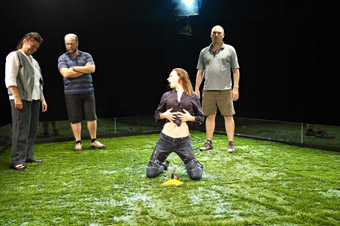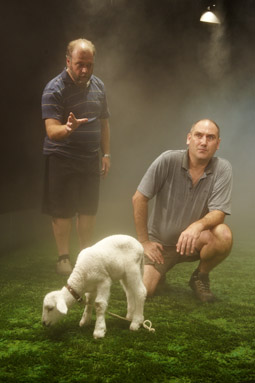the sacrifice of father-daughter love
keith gallasch: tom holloway's love me tender, belvoir street

Love Me Tender, Thin Ice Productions
photo Jon Green
Love Me Tender, Thin Ice Productions
In a fascinating exercise in theatrical narration and with near agitprop urgency, Tom Holloway’s Love Me Tender directly addresses the contemporary rift in family intimacy wrought by two forces: the premature transformation of girls into women and the fear of sexually abusive fathers.
The play is inspired by, but is not an adaptation of, Euripides’ Iphigenia in Aulis (408-6 BC). Pressured by an army approaching murderous revolt, Agamemnon, king of Mycenae, sacrifices his daughter so that the gods will provide the winds to drive his stilled fleet to Troy to retrieve the abducted Helen, wife of his brother Menelaus. Euripides’ enduring account is complexly tragic, played out in a field of constantly shifting motives and loyalties. The playwright’s achievement lies in revealing that however much the gods can be invoked to rationalise human actions, the choices made are actually less clearly motivated—they are personal, social and, not least, political—and often not reliable—even Iphigenia changes her mind, ‘heroically’ (as it is often put) accepting her father’s will and going to her death. Filial love is brutally compromised by political pragmatism—Agamemnon still loves his daughter, but not enough to let her live and put at risk his power and the lives of the rest of his family.
In Holloway’s play, the setting is abstractly contemporary—a raised green pentagonal lawn bordered by a low perspex fence has something of the feel of a vividly illuminated specimen case into which we peer, watching what soon appears to be a nasty experiment. In this laboratory a man (Colin Moody) struggles to tell, or to invent, his story, prompted, cajoled and corrected by a chorus-like male (Arky Michael) and female (Kris McQuade) pair. The constant pressure and rapid alternations in the dialogue heighten a sense of improvisation apt for an experiment in which a man conjures a ‘what if?’ world where a father might sacrifice his daughter for the greater good of the community.
The language, as usual with Holloway, is sharply observed everyday Australian frequently delivered in staccato one line utterances, outbursts and interruptions yielding a constant sense of uncertainty, interrogation and of thinking aloud that is nonetheless cumulatively fluent and poetic in its repetitions and reworkings—if requiring an alert audience ear. But it’s more than a matter of style: Holloway’s language reveals from the play’s very beginning that the world we are observing is a socially and imaginatively constructed one and, initially chronologically ambiguous. The diction of the man and his prompters suggests the world of Homer or Virgil (“the sun hits the dust in the air…like pillars of fine, floating flakes of snow…they are ripped apart into…into…Chaos?). The trio’s narrative accelerates: the man rushes home to find another between his wife’s legs—jealousy and anger threaten—but it’s a doctor delivering their daughter. Even so, ambiguity persists: “Her fur and hooves. Now I see her hooves. Wet with placenta and blood.” The sense of a mythic world—with the line between man and animal blurred—is suddenly amplified. Uncertain of his feelings—love? joy?—the man arrives, with prompting, at a state where he experiences “amazing and yet terrible flashes of what is to come and suddenly I am filled with an immense and overwhelming sense of love and horror.” In a matter of minutes the play’s dynamic (of a world being invented) and its layering of the epic and the domestic, of human and animal, and of an event foretold, but not revealed, are immersively at work.
A burst of celebratory optimism—”I think it is the best time to bring a little girl into the world”—details the many opportunities for women these days (run marathons, banks, corporations, visit a strip club, “sacrifice herself for…some great cause”). But it’s immediately subverted by a list of threats to young girls that requires their protection—”It’s almost impossible to keep your children safe these days.” “It’s scary.” “Yes.” “What might be done to them.” “Yes.” “To their little bodies.” “Their hooves. Their fur.” But ambivalence creeps in: “…they taste so good.” “They are succulent like nothing else.” “They get them fresh. Straight from the parks and homes and churches and schools and straight onto the plate for us.” In Matthew Lutton’s production this dialogue is delivered by the man and the male prompter (the printed script does not specify who says what, leaving it a directorial choice), making the inference of co-existing and conflicting male desires unavoidable.
The next dialogue between the two men, where the father expresses pleasure in playing with his daughter and his attempt to understand what it is that passes between them, is undercut respectively by the prompter’s suspicions of sexual interference and his incomprehension of what the father sees as the spiritual nature of the relationship. The prompter is limited strictly to “Right,” “Sure”, “What”, but Arky Michael wrings every shade of suggestiveness and concern from them until the father erupts: “Everyone’s first thought goes to dad teaches daughter how to fuck and suck because that…all that…that is what they know.”

Love Me Tender, Thin Ice Productions
photo Jon Green
Love Me Tender, Thin Ice Productions
Subsequently, the man waters the lawn with a sprinkler. Amidst the spray, his wife (Belinda McClory) dances at a party to a chorus of cries directed at young girls: “Don’t forget your cut-off top!” “Got to show that cute little midriff!” “Are your g-strings showing?” The dance is increasingly and convulsively erotic until the wife collapses before her distant husband. She then becomes a pathetic figure, watching helplessly from the sidelines. She’s certainly no Clytemnestra, the dance suggesting she is complicit in the sexualisation of her daughter.
Having more than firmly established the doting father’s anxieties, Holloway now addresses the man’s public role; he’s a fire fighter chief whose wife wonders why “he has disappeared so much?” “Like he wants to confess some kind of thoughts to me.” “I can’t help but feel that something bad is going to come of all this.” Brief monologues are scattered between the dialogues, some delivered by a Chorus (played as a policeman here by Luke Hewitt), describing a fire-ruined landscape, a destroyed home, a lost girl, or is it an animal (“The ash stains her fur.”) This is the otherworld the father and the policeman occupy. As the fire mounts, the family gather with refugees at a swimming pool. The girl (now “ten-eleven twelve”) is there with “a boy that is a friend.” The father “[i]s standing there…knowing full well that there was nothing at the pool for them. Nothing but the anger of the gods.” He is anxious about “Not being off where his community needs him”, but what fills his mind and pours from his and the prompters’ mouths is a long, tirading litany of all the fears in him that his daughter’s almost pubescent body in a “tight little bikini” elicits—teen dance troupes, increasingly early physical maturation, a daughter catching a father cock-in-hand watching porn, predators at the pool, boy or boyfriend? “And suddenly he wants to let the fire burn!…to burn out all the psychos and freaks and degenerates because the world is fucked!”
Again, this is teamwork, urged on by the man’s prompters. He asks, “Is that about right?” They reply, “Absolutely.” He then feels compelled to sacrifice his daughter. A live lamb, representing the daughter, is brought on stage. The policeman demonstrates elaborately how to cut its throat. The wife, wet, quivering, sobbing, watches from the side. The father exits with the lamb. The policeman recites his own tale of shooting of wounded deer during the fire. The father returns, bloodied from the sacrifice to recount the death of his daughter in more literal terms: cries on the radio from the community for help had drowned out the screams of his daughter trapped in “the car he bought her so she could learn to drive.” He cannot or rather will not save her, watches her die, turning instead to the community “[w]here he needs to be a hero”, but crumbles into the chaos prefigured at the play’s opening. In this penultimate scene Colin Moody allows the father louder passion and pain than previously: perhaps they might have conveyed more if delivered quietly. The play ends with the sadly fatalistic American folk song “I am weary (let me rest)”; in the script it’s described as “Epilogue: Iphigenia replies…” She has accepted her fate.
Love Me Tender is an unusual theatrical experience. The non-literal setting and the manner in which the dialogue and parallel worlds are team-constructed generate a palpable distancing effect which is counterbalanced by a sense of urgency and suspense and of having to, as an audience, make the work intelligible—piecing together the shared first, second and third person accounts of characters and events. The spare, patterned blocking, the playing directly to the audience, the moments of song, the human-animal interplay and the inventive chorus model embodied in the two prompters collaborating with the man in his drive to psychosis aptly if never literally echo Greek tragedy. As a modern version of Euripides’ Iphigenia, the play portrays a like world, but instead of an army in revolt and gods to be appeased there’s a community obsessed with the vulnerability of children, their sexuality and the way it complicates father-daughter intimacy. The father, opting for responsibility to community, to save lives as a fire fighter, abandons his daughter. Ironically it is the same community’s pathological fears that have driven him to sacrifice the child he loves, if he still does. Love Me Tender is at once an indictment of the premature sexualisation of children and of the possible consequences of the fear of it—enacted as the sacrifice of love, not just of a life.
Although a memorable production with performances totally on top of the considerable demands of Holloway’s script, I was left with some doubts about the play. It’s a work by a man about a male plight, one worth exploring, but it does little for its female characters—the daughter is only referred to, save appearing as a lamb, and the mother an onstage cipher. Neither this Iphigenia nor this Clytemnestra can offer an account of their condition, nor defend themselves against the will of the men. They cannot challenge their fate without complicating the playwright’s thrust in what is essentially a monodrama, a very clever and timely one, and almost tragic—though the father is denied any insight into his condition. Love Me Tender’s dynamic is compelling, but in the end its reliance on the play of thematic oppositions into which the feminine is not allowed to intrude limits its capacity to speak beyond the contradictions forced on the father-daughter relationship. As an experiment, not just in submitting a man to the extremities of collective social pathology, but as an exercise in adventurous narrative form, Love Me Tender is exactly what Australian theatre needs.
For another modern version of Iphigenia in Aulis, one that keeps the female roles alive, take a look at novelist Barry Unsworth’s wonderful The Songs of the Kings in which the world of Agamemnon’s army is eerily imbued with contemporary corporate-speak.
Company B Belvoir, Griffin Theatre Company & Thin Ice: Love Me Tender, writer Tom Holloway, director Matthew Lutton, performers Colin Moody, Belinda McClory, Luke Hewitt, Kris McQuade, Arky Michael, design Adam Gardnir, lighting Karen Norris, sound Kelly Ryall; Belvoir St, Sydney, March 18-April 11, www.belvoir.com.au
RealTime issue #95 Feb-March 2010 pg. web






